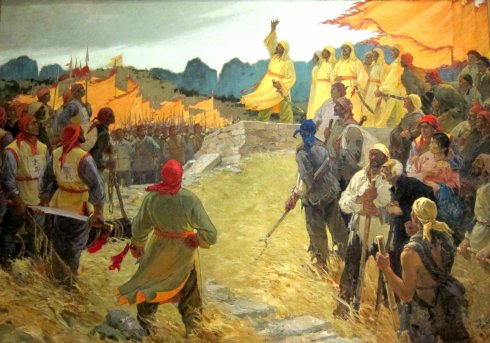清朝
The Taiping Rebellion
太平起义
During the mid-nineteenth century, China’s problems were compounded by natural calamities of unprecedented proportions, including droughts, famines, and floods.
19世纪中期,中国的麻烦由空前的自然灾害造成,包括干旱、饥荒和洪水。
Government neglect of public works was in part responsible for this and other disasters, and the Qing administration did little to relieve the widespread misery caused by them.
政府对于市政工程的忽视是造成灾害和其他一些灾难的部分原因,并且清政府并没有实行举措来缓解由它们带来的大范围苦难。
Economic tensions, military defeats at Western hands, and anti-Manchu sentiments all combined to produce widespread unrest, especially in the south.
经济紧张、与西方国家交战失败和反清的情绪共同导致了广泛的动荡,尤其是在南方地区。
South China had been the last area to yield to the Qing conquerors and the first to be exposed to Western influence.
中国南方是最后一片向清朝屈服也是最早受到西方影响的地方。
It provided a likely setting for the largest uprising in modem Chinese history---- the Taiping Rebellion.
这为中国近现代史上最大的一次起义——太平起义创造了条件。

The Taiping rebels were led by Hong Xiuquan (1814—1864), a village teacher and unsuccessful imperial examination candidate.
太平起义军由洪秀全(1814——1864)领导,他是一个乡村先生,在科举考试中名落孙山。
Hong formulated an eclectic ideology combining the ideals of pre-Confucian utopianism with Protestant beliefs.
洪秀全制定了一个折衷的意识形态,将早先儒家的乌托邦思想与新教的信仰结合起来。
He soon had a following in the thousands who were heavily anti-Manchu and anti-establishment.
他迅速拥有了成千上万反清和反建制的追随者。
Hong’s followers formed a military organization to protect against bandits and recruited troops not only among believers but also from among other armed peasant groups and secret societies.
追随者们成立了一个军事组织以对抗土匪并从其他农民武装组织和机密团体而不仅仅是教徒中招募军人。
In 1851 Hong Xiuquan and others launched an uprising in Guizhou Province.
1851年,洪秀全和其他人在贵州省发动起义。
Hong proclaimed the Heavenly Kingdom of Great Peace (or Taiping Tianguo) with himself as king.
他建立了太平天国并自己称帝。
The new order was to reconstitute a legendary ancient state in which the peasantry owned and tilled the land in common; slavery, concubinage, arranged marriage, opium smoking, footbinding, judicial torture, and the worship of idols were all to be eliminated.
新规规定要重新建立一个传说中的国度,农民共同拥有和耕作土地;奴隶制、纳妾制、包办婚姻、抽鸦片、缠足、严星拷问和偶像崇拜都被禁止。
The Taiping tolerance of the esoteric rituals and quasi-religious societies of south China---- themselves a threat to Qing stability---- and their relentless attacks on Confucianism---- still widely accepted as the moral foundation of Chinese behavior ---- contributed to the ultimate defeat of the rebellion.
太平天国对于中国南方的神秘仪式和准宗教社会的宽容使它们成为了清朝的一大威胁,它们对于仍被认作是中国行为道德根基的儒家文化的残酷攻击导致了起义的最终失败。
Its advocacy of radical social reforms alienated the Han Chinese scholar-gentry class.
它们对激进的社会改革的拥护使其遭到了中国汉家上流学者阶层的孤立。
The Taiping army, although it had captured Nanjing and driven as far north as Tianjin, failed to establish stable base areas.
太平军尽管攻占了南京又向北打到了天津却没能建立一个稳定的根据地。
The movements leaders found themselves in a net of internal feuds, defections, and corruption.
统治者间存在着内部纷争、变节与贪污腐败。
Additionally, British and French forces, being more willing to deal with the weak Qing administration than contend with the uncertainties of a Taiping regime, came to the assistance of the imperial army.
不仅如此,英国和法国的军队更希望与清朝谈判而不愿与太平天国的不确定作斗争,他们为朝廷军提供了帮助。
Before the Chinese army succeeded in crushing the revolt, however, 14 years had passed, and well over 30 million people were reported killed.
在中国军队成功摧毁起义前已经过去了14年,据传被杀害的人数超过了30000000.
To defeat the rebellion, the Qing court needed, besides Western help, an army stronger and more popular than the demoralized imperial forces.
为了击败叛乱,清廷除了需要西方军队的帮助外还需要一只更强大、比士气低迷的朝廷军更得民心的军队。
In 1860, scholar-official Zeng Guofan (1811—1872), from Hunan Province, was appointed imperial commissioner and governor-general of the Taiping-controlled territories and placed in command of the war against the rebels.
1860年,来自湖南省的士大夫曾国藩(1811——1872)被任命为钦差大臣以及太平天国统治地区的总督,他被命令与起义军开战。
Zeng’s Hunan army, created and paid for by local taxes, became a powerful new fighting force under the command of eminent scholar-generals.
曾国藩由当地税收创建和支付薪酬的湘军,在这位杰出的士大夫将领的指导下,成为了一支强大的新的作战部队。
Zeng’s success gave new power to an emerging Han Chinese elite and eroded Qing authority.
他的胜利为出现的汉人精英提供了新的力量并瓦解了清朝的主权。
Simultaneous uprisings in north China (the Nian Rebellion) and southwest China (the Muslim Rebellion) further demonstrated Qing weakness.
在中国北部(捻军起义)和西南部(穆斯林起义)同时发生的叛乱进一步展现了清朝的软弱无能。


